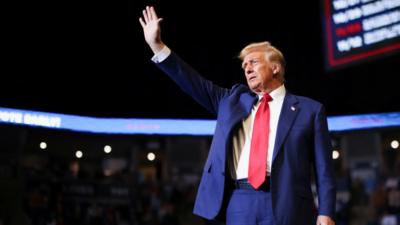Cash News

The International Monetary Fund and World Bank annual meetings were dominated by concerns over low growth, high debtand escalating wars, but finance leaders were preoccupied with the potential consequences of Donald Trump’s possible return to power in the upcoming US presidential election.
Trump’s recent gains in polls, erasing much of the early lead held by his Democratic rival, US Vice President Kamala Harris, were a topic of discussion among finance officials, central bankers, and civil society groups attending the meetings in Washington.
There were fears that Trump could disrupt the global finance system with substantial tariff hikes, trillions of dollars in additional debt issuance, and a shift away from climate change mitigation efforts in favour of increased fossil fuel energy production.
“Everyone seemed to worry about the high uncertainty on who would become the next president, and what policies would be taken under the new president,” said Bank of Japan governor Kazuo Ueda.
Another central banker, speaking anonymously, expressed the concerns more directly: “It’s starting to feel like Trump is going to win.”
Trump has pledged to impose a 10% tariff on imports from all countries and 60% duties on imports from China, which would impact global supply chains and likely trigger retaliation, driving up costs. German Finance Minister Christian Lindner warned that a US-EU trade war would only produce losers.
Trump has also proposed numerous tax breaks to attract US voters, which budget analysts estimate would add at least $7.5 trillion in new US debt over a decade, on top of the $22 trillion in debt growth previously projected by the Congressional Budget Office through 2034.
In contrast, a Harris victory is seen by finance officials as a continuation of President Joe Biden’s re-engagement in multilateral cooperation on climate, corporate taxes, debt relief, and development bank reforms, although her plans would also increase debt, albeit to a lesser extent than Trump’s.
Financial markets are witnessing a resurgence of “Trump trades” in various assets, betting on a Trump victory as his poll numbers have improved. The dollar has experienced its most significant monthly gain in over two-and-a-half years, with an index measuring the greenback against major currencies up 3.6% in October so far. Brazil’s central bank chief Roberto Campos Neto noted that pro-Trump market bets were already having an inflationary impact on long-term interest rate futures in the dollar-sensitive economy, adding that both Trump’s and Harris’ fiscal plans had inflationary elements.
These concerns about a Trump reversal on trade and spending emerged as the IMF declared that the global fight against inflation had largely been won without significant job losses, with US strength offsetting weakness in China and Europe.
IMF managing director Kristalina Georgieva urged policymakers to begin reducing the massive pile of Covid-induced debt to avoid a low-growth future that would leave populations increasingly dissatisfied.
When asked about how the prospect of a Trump return affected the meetings and IMF policy advice, Georgieva said that the discussions had focused on addressing the current economic challenges.
“The sentiment of the membership is that elections are for the American people,” Georgieva said at a news conference. “What is for us to identify is what are the challenges and how the IMF can constructively address these challenges.”

